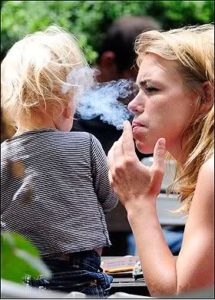 Over the years we have had many clients who have queried why their children seem to suffer one cold after another. Girlfriends who have said, “but why does Sammy keep getting ear infections?” Sometimes, the long-term lifestyle choices we make as adults are so unconscious that we literally miss the impact they may have on our children.
Over the years we have had many clients who have queried why their children seem to suffer one cold after another. Girlfriends who have said, “but why does Sammy keep getting ear infections?” Sometimes, the long-term lifestyle choices we make as adults are so unconscious that we literally miss the impact they may have on our children.
In discussing the impact of passive smoking for children let me begin by saying that I do not wish to offend or alienate anyone, as adults we all have addictive habits. Some of us smoke or drink, some of us literally run on caffeine or adrenaline whilst a great many others live on sugar. We all have our ‘vices’. The reality is though, some of these addictions are more dangerous than others and some addictions will more readily impact the lives of our loved ones.
If you are a smoker, (including all “out of the house smokers”) please read the following research summary and consider how the smoke that lingers around you has a direct impact on the health of the little people (and also the bigger ones) who live and travel with you.
* Chronic middle ear disease is 20–50% more frequent in children exposed to environmental tobacco smoke.
A systematic review of numerous published studies gave a consistent association, and calculations suggested that every fifth operation for middle ear effusions is caused by exposure to tobacco smoke products (TSPs).1
* Babies who are ‘smoked over’ are more likely to be hospitalised and to suffer from respiratory and gastrointestinal illnesses. Studies show that these infants are more likely to be colicky and irritable and to experience a wide range of problems from apnea (short periods when the baby stops breathing), vomiting, poor growth, squint (strabismus, cast or lazy eye), hearing impairment and unexplained death. Smoking depresses the immune system, leaving both the mother and infant more vulnerable to infection, allergy and other immunodeficiency problems2.
Proven Associations Of Passive Smoking Affecting Children*3
(W Hofhuis, J C de Jongste, P J F M Merkus.Adverse health effects of prenatal and postnatal tobacco smoke exposure on children. Arch Dis Child 2003;88:1086-1090.)
- Increased incidence of obstetric complications
- Reduced birth weight
- Reduced head circumference at birth
- Increased incidence of SIDS
- Increased incidence of meningococcal infections. Increased incidence of acute lower airway infections (0–3 years)
- Increased incidence of middle ear disease
- Increased incidence of wheeze (0–5 years)
- More frequent respiratory symptoms (5–16 years)
- Persisting reduced lung function
Possible Associations Of Passive Smoking In Children:
-
- Reduced and disturbed intra-uterine lung growth
- Increased incidence of perinatal complications
- Risk factor for neurodevelopmental and behavioural problems
- Childhood cancer
1)K Carlsen, K Lødrup Carlsen. Respiratory effects of tobacco smoking on infants and young children. Pediatric Respiratory Reviews 2008; 9: 11-20.
2) J Liston. Breastfeeding and the use of recreational drugs – alcohol, caffeine, nicotine and marijuana. Breastfeeding Review 1998; 6(2): 27-30.Australian Breastfeeding Association https://www.breastfeeding.asn.au/bfinfo/drugs.html
3) W Hofhuis, J C de Jongste, P J F M Merkus.Adverse health effects of prenatal and postnatal tobacco smoke exposure on children. Arch Dis Child 2003;88:1086-1090.)


